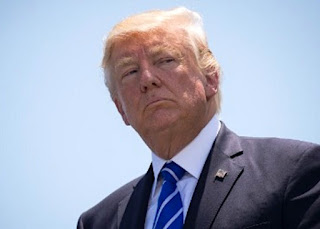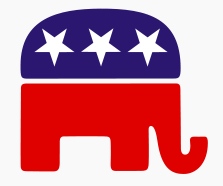House Trump: Hearing footsteps in the new year
WHEN IN THE COURSE of human events you’re faced with so many events in a short time that you don’t know where to begin ... you don’t begin.
That’s the challenge facing yours truly and every political analyst, blogger and opinionated American with the dawn of this new year — not just any new year. For me it started late in 2017: creatively frozen, trapped in an interminable funk fed by the ongoing series of wildfires in California; the baffling inanities and geopolitically provocative tweets from the White House; and a general malaise I’m led to believe was an expression of the current collective unconscious. Christmas felt forced, vacant, bereft. New Year’s Eve at midnight was spent howling “HAPPY NEW YEAR!” at the drivers passing my house in East Hollywood, waving a bottle of cold duck. More than a few honked or shouted in agreement as they drove by.
Not surprised. Understatement of the decade: We’ve been eager to turn the page on 2017. Any year that could usher out Chuck Berry, Walter Becker, Charles Bradley, Fats Domino, Glen Campbell and Tom Petty, and usher in the quasi-presidency of the most dangerous carnival barker in history is a year that deserves to be forgotten, asterisked, if not for the upheaval that occurred in that 365 days we just got out of, a little more than three weeks ago.
◊ ◊ ◊
But now it gets interesting. On a number of political fronts, last year was a building prelude to the storm that’s about to be unleashed at the White House, the Justice Department and on Capitol Hill. Florsheims have been dropping for months now, not just in Washington but in places and with results that will have an impact on Washington, from now to the election less than eleven months away.
The biggest chicken roosting this election year will rest on the head of the beast that is the Republican Party. Years of gridlock – not just the interparty gridlock we’ve come to expect, but also the philosophical gridlock within the party, the conflict that’s typified the GOP since at least the Tea Party’s rise in 2009 – are about to yield, ironically, the kind of painful, forced evolution required when a voluntary evolution apparently isn’t possible.
The Republican Party is about to be dragged kicking and screaming into a future it’s been haplessly designing, and denying, for years.
◊ ◊ ◊
THE PROBLEM for the GOP begins with a White House on a vendetta. From the jump, Donald Trump made it clear that his Job #1 was to undo as much of the eight years of the legislative and political legacy of Barack Obama as possible. He maybe never actually said it, word for word, but he never had to. With a flurry of executive actions and tweets, Trump set his intentions in motion and began rolling back various Obama-era initiatives and policies.
The Trump White House thus defined its own first year in the White House by the metrics of its able predecessor. For that reason, there’s been little or nothing affirmative about House Trump a year in. Trying to undo that predecessor’s work has negated Trump’s own agenda. To the extent he ever had one.
Michael Caputo, a Republican operative and another veteran of Trump’s presidential run, blamed Congress for inaction on the Trump first-year “agenda.” “I think we all trusted the Congress too much,” he told The Daily Beast in November. “Today we know leaders of both houses have not been able, or even willing, to deliver on the President's agenda. If I knew we would have so many problems on Capitol Hill, I would have urged the president to move immediately on tax cuts and infrastructure after the Inaugural.”
Trump apologist/mouthpiece/cheerleader Scottie Nell Hughes said much the same thing to The Daily Beast on Nov. 8: “President Trump and his team should have been ready to introduce and push for the vote almost immediately of his top three campaign promises,” Hughes added. “Tax reform, repeal and replace AHCA & legislation to build the wall (in that order) should have been ready, introduced and voted on before the opposition could organize against. Instead, this administration lost their focus in the fog of the swamp and was swallowed up by the status quo.”
This underscores a major problem for the Trump administration. Leaders of both houses haven’t followed through on the Trump agenda because, strictly speaking, there isn’t one.
◊ ◊ ◊
From Trump’s efforts to marginalize Muslims and immigrants to his monstrous “shithole countries” comment about Haitians, Salvadoreans and people from African nations; from actions rolling back environmental protections to breathtaking contradictions and inconsistencies in dealing with other countries, the transactional, small-hearted actions taken since last Jan. 20 — spasmodic treacheries, callous deceits — don’t qualify as an agenda. They barely qualify as “actions.”
Yes, Trump scored a much-needed win with the Tax Cuts and Jobs Act — his signature piece of legislation to this point. But with that exception — and we still don't know who'll really benefit from that besides the smitten multinational corporations, and their CEOs — there’s been nothing ennobling and pragmatic from House Trump, no throughline to most of his works in the Oval Office except the mercurial rage of their author, and his punitive intent. It’s all been very angry and small.
Trump, careening from lane to lane since before day one, doesn’t really have an agenda. The central reason why he has no agenda? He may not really want one.
In his 2016 campaign, Trump presented himself as a true maverick, a hothouse carnivore, a seat-of-the pants outlier whose promised willingness to improvise in office wasn’t just a quirk or a bullet point; it was central to the ethos of the Trump campaign. Inimical to the traditions of the presidency, the outsider got inside and started doing things His Way. The last thing a man wants to do, after vowing to “drain the swamp,” is to adopt the swamp-dweller's language.
An agenda of his own, a doctrinal overview in the classic political sense, a granular platform thoroughly defining his vision, his worldview, his picture of the United States and its interaction with the evolving college of the world’s nations .... well, doing that, in his mind, might mean breaking a campaign promise to not think and talk like the pointy-heads on the Potomac. OK, that last part's over the top. It might just be that much long-attention-span orderliness is simply beyond him, something outside his emotional and intellectual bandwidths.
◊ ◊ ◊
THE CLOSEST thing we have to that overview — Trump’s national security statement, released on Dec. 17 — leaves a lot to be desired. Intended to showcase a return to pragmatism, hard-nosed diplomatic overtures, and the conclusively persuasive powers of the world’s pre-eminent military force, the statement promulgates a national security framework that is, according to people in a position to know, a Trump policy in name only.
We might, for example, thank national security adviser H.R. McMaster for putting his spin on the events. A military man, McMaster reportedly characterized the summary statement by invoking a phrase from the Reagan days of yore: “Peace Through Strength.” His fingers certainly aren't the only ones deep in this pie.
Despite the months of preparation, despite the drumroll and throat-clearing before the announcement, the statement was less a national security strategy than a national strategy — conditional, zero-sum-game — thinly disguised as a second-term advertisement for Trump himself. McMaster accidentally revealed as much. “In many ways, we vacated a lot of competitive space in recent years and created opportunities for these revisionist powers,” McMaster said, in a kettle-calls-pot-black statement reported by the Los Angeles Times on Dec. 18.
But given Trump’s penchant for cultivating polarities and choosing sides, his administration has done what it's accused the Obama White House of doing: vacating the United States’ geopolitical and imagistic high ground, as a democratic example and a global partner — and Trump’s done it in less than a year.
◊ ◊ ◊
The debilitating irony of all of this is that, sooner or later, the president* can be expected to undermine the more methodical aspects of his national security posture — to contradict himself — with the midnight tweets and shoot-from-the-hip comments that don’t so much inform his style of leadership as much as they define it. Watch and see.
Ian Bremmer at TIME was thinking about that too in his Dec. 19th reaction piece: “[T]he first time the president tweets something that appears to contradict the new strategy, how should the world understand the contradiction? Does Trump believe his own strategy? How does the principle of “America First’ square with plans to promote democracy in other countries? How much will the administration expect taxpayers to invest in the democracy promotion project? The strategy doesn’t answer these questions, and the distance between Trump’s rhetoric and some of the more high-minded, values-based principles in the document obscure[s] more than they reveal.”
“America First” is great bumpersticker boilerplate that’ll play well to an angry, incurious electorate in the heartland. How well it travels internationally, in a world that gets smaller and more necessarily interdependent all the time, is another matter entirely. But whatever else it is, it’s not an agenda.
◊ ◊ ◊
AND FOR those seasoned in the way Washington works, for persons with even the slightest experience working the utensils by which the sausage-making of American democracy occurs, the machinations of a rank amateur don’t constitute an agenda any more than the passing of time during that amateur’s tenure in the White House to date constitutes an “era” or an “age.”
The conflict that Trump faces from the lawmakers on Capitol Hill wouldn’t be changed in the least if Trump had moved first on tax reform or anything else. It’s all about a perceived failure of leadership. Proof? On Dec. 18, the Los Angeles Times reported that “veterans of past Republican administrations ... complain that Trump has ceded leadership around the globe economically and diplomatically, opening opportunities especially for China and Russia ...”
The issue is as much the messenger as the message, but neither one is ready for prime-time. Rank-and-file Republicans, the ones who respect the process and the procedures Trump is eager to torch, aren’t quite as ready as Trump is to burn down the village of the United States in order to save it.
Maybe none of which matters overmuch to one man in particular. The footsteps Donald Trump has been hearing since late last year are getting louder, and only some of that’s coming from Capitol Hill. Much of that is coming, day by day, from one Robert S. Mueller III, Special Counsel.
◊ ◊ ◊
Conservatives have been calling for Mueller to be ousted for his relentless role in investigating Russia’s almost certain meddling in the 2016 election, and the possible role of Trump campaign insiders in making that meddling successful. Trump’s in something of a box: He insisted late last year that Mueller’s job was safe, revealing a good grasp of the obvious, announcing Mueller’s job security as if he were graciously bestowing a papal benevolence.
Despite the howls for Mueller’s blood, Trump knows good & damn well he can’t fire Mueller – not without awakening the spectre of President Nixon’s Saturday Night Massacre of October 1973, and aligning an already damaged Republican Party with historical optics it would certainly just as soon avoid. Nothing on earth would be more of an obstruction-of-justice magnet than Trump firing Mueller.
But as the inquiry cranks up and moves forward, Trump finds himself increasingly in the untenable position of not being able to get in front of the events that could derail his time in the White House. He’s at the mercy of forces he can’t control, an un-Trumpian position to be sure.
Trump & Co. are fighting a two-front war, and failing on both fronts. The various ad hoc moves of House Trump over the past year must be defended, or at least explained to an increasingly unfavorable public response. And the Trump White House’s other reality, the Mueller investigation – and suspicions of Russian hacking, Russian collusion and Trump campaign involvement in an attempt to subvert the 2016 vote – must be resisted or minimized. They can’t be ignored.
◊ ◊ ◊
AND THE FLORSHEIMS over the Russia matter have only started to drop. NBC News reported Wednesday that “[b]y the end of 2017, special counsel Robert Mueller’s team had spoken with Director of National Intelligence Dan Coats; Mike Rogers, the director of the National Security Agency; former FBI Director James Comey; and numerous members of Trump’s campaign and White House inner circle.”
Attorney General Jeff Sessions, the first known member of Trump's cabinet to be interviewed, was “questioned for several hours last week” by Mueller, The New York Times reported Tuesday.
CNN, citing “two people familiar with the investigation,” reported Wednesday that Mueller intends to quiz former White House chief strategist and media prince of darkness Steve Bannon about Trump's decisions to fire Flynn and James Comey, the former beleaguered FBI director.
◊ ◊ ◊
”From his early days in the administration, Bannon was wary about the Russia investigation seeping into operations in the West Wing,” CNN reported. “He had only been working as chief strategist for a few months when he began trying to avoid meetings and discussions that could one day wind up of interest to investigators in the various Russia probes, according to sources familiar with the situation. ...
“While Bannon may not have played a pivotal role in some of the key decisions that are raising alarms with investigators, even his knowledge of the President's mindset at the time could come into play.”
“Bannon is set to interview with Mueller by the end of the month,” CNN reported, revealing a date that, whenever it is, is already too deliciously close to Trump’s first State of the Union address, set for Jan. 30th and likely to top the reality-show ratings for Tueday night.
What’s coming next is nicely bookended by what’s already happened. It was one year ago Wednesday when Michael Flynn, then the national security adviser, met secretly with the FBI just days after he being sworn in to the job he would occupy for 24 uproarious days.
◊ ◊ ◊
BY NOW, YOU’VE probably got a sense of how this is going to work. If you’re a student of 20th-century American politics, and the Watergate scandal, you know a scandal’s reverberant revelations often start at the margins, the outer edges, on the periphery of everything that seems to be important.
Donald Trump heard drumbeats over the holiday season, and he’s been hearing more politically ominous sounds in the still-New Year. He may have been even more eager to get 2017 over with than we were, but 2018 is not an inviting prospect for House Trump. The bad road in the rear-view mirror is the same road that’s ahead of this White House in the windshield, right in front of them.
Image credits: Trump top: Drew Angerer/Getty. Daily Beast logo: © 2018 The Daily Beast. S**t for Brains cover: New York Daily News. Mueller: Charles Dharapak/Associated Press. Commissar Trump: MER. Bannon: Carol Allegri/Reuters. Trump bottom: Brendan Smialowski/AFP/Getty.













.jpg)
Thanks for your blog. If anyone want to know about political related company, courses, career etc, this company will be the rightchoice for you.
ReplyDeleteElection Consultant India
How to start political career in india
Political communication courses